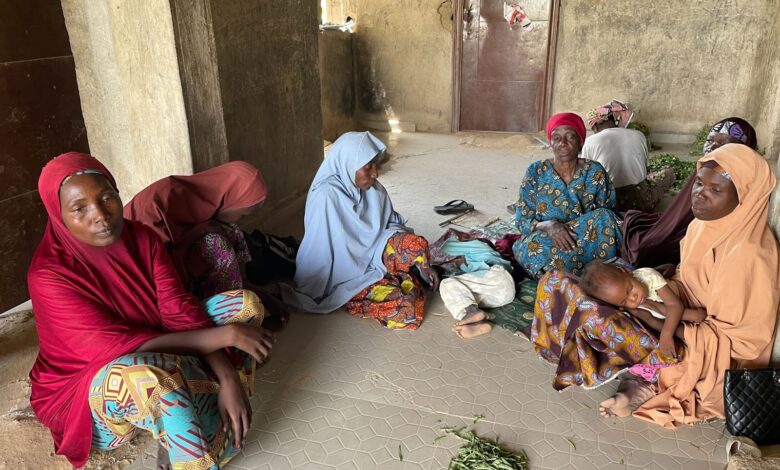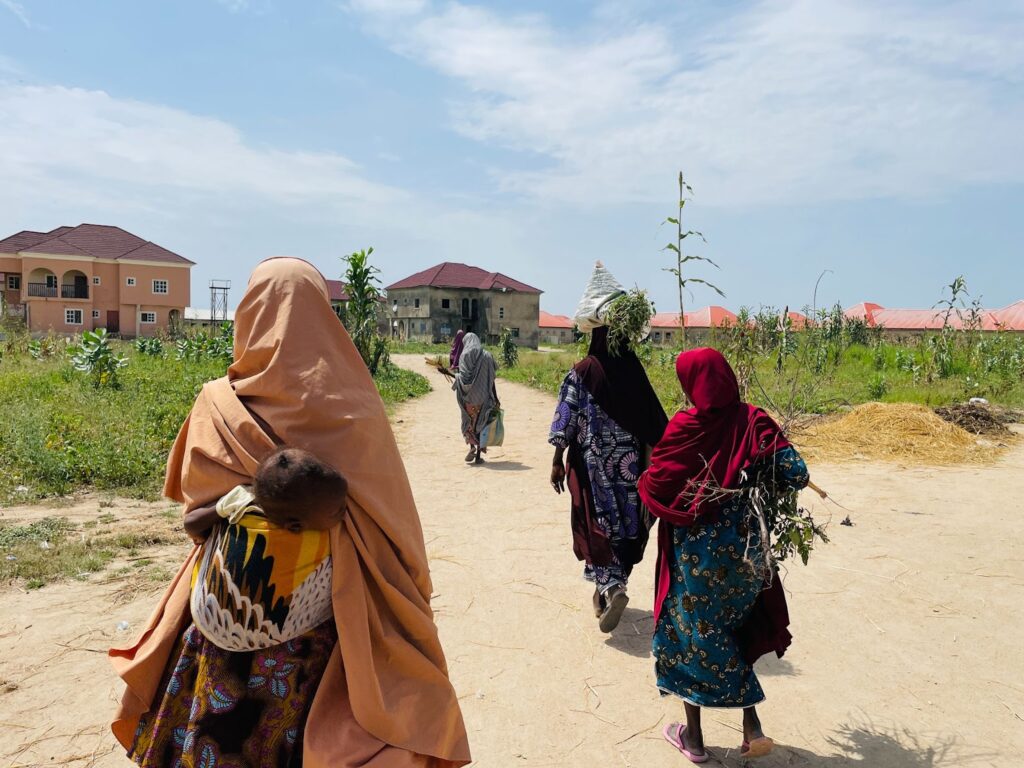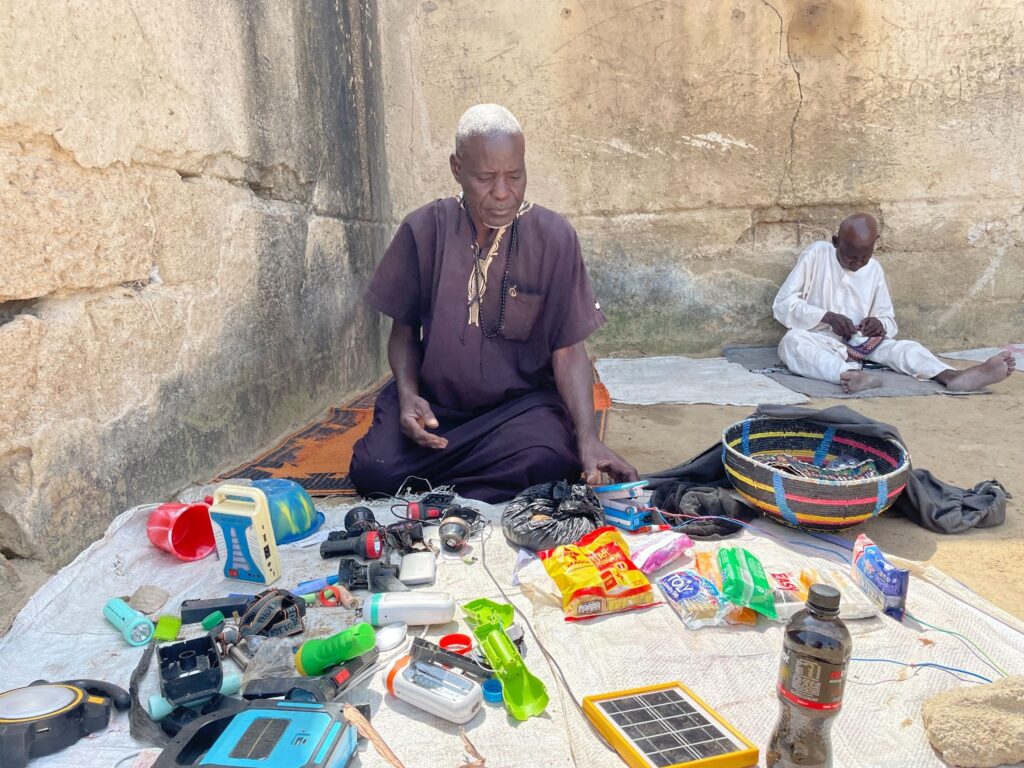‘I am Really Tired’: Maiduguri Flood Survivors Share Struggles and Resilience in Bakassi Camp
Displaced by floods and now coping with life in the camp, families share their struggles, resilience, and hopes for recovery.

At Bakassi Camp in Maiduguri, North East Nigeria, a quiet resolve marks the faces of women who, months after a devastating flood, find themselves still grappling with survival. This afternoon, the women, from their thirties to their fifties, gather to share their stories of resilience.
Among them is Yagana Muhammad, who recalls how she had to rely on strangers’ food donations to feed her family in the days after the disaster.
“I missed the intervention card distribution because it was handed out before I arrived,” she says. The only assistance she has gotten since her stay in the camp is a few essentials from UNICEF: a bucket, soap, cups, sanitary pads, and underwear.
For Yagana, this aid is barely enough, and she has even had to sell some of these items to buy food for her family. Her small business—a lifeline that once gave her independence—is gone, leaving her with no income.
“I am really tired of staying here. My husband is blind, and I have always supported him in everything he does,” she tells HumAngle.
Her rented house in Shehuri North was half-destroyed by the floods, making it impossible to return. The only thread of hope she clings to is that, two weeks ago, the government registered her house for rebuilding.
“I know the government is overwhelmed, but I still have hope that things will improve on my end,” Yagana says, though her eyes betray a weariness that words cannot hide.
Battling family separation and illness in the camp
Zara Ali vividly remembers arriving at the camp one Tuesday afternoon with her seven children. She immediately received the ‘intervention card’, along with ₦10,000 and food items like rice and pasta.
Zara said living alone with her children even before the flood was difficult. Her husband travelled to southern Nigeria for work many months ago, and she has not communicated with him since.
“People think we are just staying here to get abundant aid, but that’s not true,” she said, expressing her frustration. “The first intervention from the government is all I’ve received since arriving. My house is completely destroyed; where else can my family and I stay if not here?”
Zara recounts the heartbreak of her son going missing during the flood, only to be found by the Civilian Joint Task Force days later. Since then, her son has suffered from vomiting and diarrhoea, and although they visited the camp clinic, his condition hasn’t improved. “I had to sell my bucket and soap to take him to a chemist outside the camp, which cost me ₦2,500 for medicine,” she says. Because of her son’s illness, Zara has been unable to go to work at the farm for four days.
Education is another concern for Zara; her children’s schooling has been disrupted since the flood, but she was relieved to hear that lessons might soon resume in the camp.
Overwhelmed by the emotional toll
For Yafannan Gwange, who previously lived alone in Gwange Sabon Gari, life at the camp has been unbearable. “I wake up with swollen eyes every day because I cry myself to sleep every night. This is my first time experiencing anything like this,” she says.
Since the camp has no steady food supply, she and her neighbours have resorted to working on farmlands near Mulai for a small income. They earn ₦500 to ₦1,000 each time, though it’s far from sufficient.

Yafanna lost everything in the flood, including her house and belongings. The clothes and shoes she is wearing are all she has left. She hopes to save enough money to rent a house and leave the camp.
Facing uncertainty and insufficient aid
Another woman, Sadiya Abdullahi, described her experience as “incredibly difficult.” One of the most challenging aspects of staying in the camp is her location at the far end, where she is often overlooked during aid distributions. “By the time it gets to us, it’s usually finished, or they tell us to wait for the next round—but that never happens,” Sadiya laments.
Sadiya is unsure of her future but hopes to resume her small rice and beans business with government support.
‘Still grateful’

Jauro Gajere, who lived in Moduganari before the flood, arrived at the camp with his family of seven the day after the incident. Three days later, the government provided him with food supplies, which have since run out.
Like many breadwinners at the camp, Jauro didn’t wait idly for more aid. He resumed his small provision business within the camp using what little stock he had salvaged.
Jauro appreciates the clean water and healthcare in the camp. “We have water and access to medicine here; no one can complain about that,” he says. Although his house was destroyed, Jauro hopes rebuilding efforts might eventually reach his area.
“For my children’s education, I made sure they didn’t stay home without going to school. The school they usually attend wasn’t affected by the flood, so I ensure they go every day from here now that it has reopened,” he adds.
A businessman’s fight to rebuild after disaster
Sheriff Maina Aji, who used to sell foodstuffs from a wheelbarrow at Maiduguri Monday Market, lost everything in the flood. He often visits his destroyed home, hoping to rebuild, but his efforts have so far been fruitless.
“My family and I have suffered a lot, especially with illnesses,” he notes. “I am still dealing with malaria, and I haven’t eaten breakfast yet, and it’s almost 1 p.m.”
Sheriff recalls the initial aid he received, including daily cooked meals, but this support has since dwindled as humanitarian organisations withdrew.
“A lot of people have already returned home,” says Sheriff. “Most of those still here have no other option. With the daily hardships, no one would choose to stay here willingly. People should stop thinking otherwise.”
This report was produced as part of the 2024 HumAngle Accountability Fellowship, with support from MacArthur Foundation.
Women at Bakassi Camp in Maiduguri, Nigeria, are facing hardships months after devastating floods.
Yagana Muhammad, a resident, relies on sparse aid, selling essentials to buy food due to her demolished income source.
Zara Ali, separated from her husband, battles challenges as her house was destroyed, and her son's health deteriorates, affecting her ability to work.
Both women struggle with disrupted education for their children.
Yafannan Gwange and Sadiya Abdullahi share similar plights, with Gwange losing everything she owned and Abdullahi facing the neglect of aid distribution.
Meanwhile, Jauro Gajere continues his small business within the camp amidst dwindling food supplies, valuing available clean water and healthcare. Sheriff Maina Aji, who lost his livelihood, battles illness and hunger, highlighting the insufficient and inconsistent aid reaching these flood victims.
Support Our Journalism
There are millions of ordinary people affected by conflict in Africa whose stories are missing in the mainstream media. HumAngle is determined to tell those challenging and under-reported stories, hoping that the people impacted by these conflicts will find the safety and security they deserve.
To ensure that we continue to provide public service coverage, we have a small favour to ask you. We want you to be part of our journalistic endeavour by contributing a token to us.
Your donation will further promote a robust, free, and independent media.
Donate HereStay Closer To The Stories That Matter




